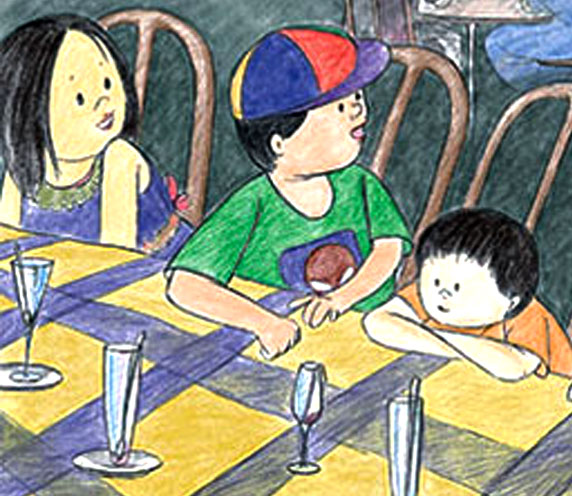Stop screaming now if you don’t want your Tasty pancake to run away to the woods meeting the Man Bran, the Hen Pen, the Rooster Booster, the Duck Vuck and the Pig Meg. And don’t let the Pig Meg swallow your tasty Pancake.


Stop screaming now if you don’t want your Tasty pancake to run away to the woods meeting the Man Bran, the Hen Pen, the Rooster Booster, the Duck Vuck and the Pig Meg. And don’t let the Pig Meg swallow your tasty Pancake.

The Tasty pancake sat on the pig's nose. Suddenly in a quick move...the TastyTale also could not go further.
As a female I am hurt, humiliated and am feeling unsafe for all the members of this gender.
The first thing I saw in the morning was the crying face of a nun who wanted her friend to be given justice. It is not just for the prey ( as they have been referred now) but is for all those who have not been given justice till date for what all they have suffered. Why is justice delayed to some and unwanted protection and discrimination to some? This should STOP. There should not be any more preys and predators here. Enough of all these nonsense. As a mother I want my daughter to be safe, I don’t want her self respect to be hurt, I don’t want to see my daughter to feel humiliated MENTALLY OR PHYSICALLY. My daughter has a right to live her life in dignity without fearing anybody with all her freedom. She should stand up with courage and face the world without the fear of getting insulted, without the fear of being pointed at.
We mothers should (if not anyone else) should react against the atrocities against our daughters, we should fight.
We can all join hands and find a way to fight strongly in our own ways and from our own space.
Our slogan: IT IS OUR DAUGHTER’S WORLD TOO. PLEASE LEAVE THEM ALONE

Reinforce in his or her mind a positive thought and confidence about his own qualities.

Parenting a teenager is never easy. But we as parents should find steps that can significantly reduce the chaos at home and help our teens’ transition into a happier, more successful young adult.
As teenagers begin to assert their independence and find their own identity, many experience behavioral changes that can seem bizarre and unpredictable to parents. Your sweet, obedient child who once couldn’t bear to be separated from you now won’t be seen within 20 metres of you, and greets everything you say with a roll of the eyes or the slam of a door. These, unfortunately, are the actions of a normal teenager.
Keeping up with fashion is important to teens. That may mean wearing provocative or attention-seeking clothing or dyeing hair. Unless your teen wants tattoos, avoid criticizing and save your protests for the bigger issues. Fashions change, and so will your teen
As teens begin seeking independence, you will frequently butt heads and argue.
Hormones and developmental changes often mean that your teen will experience mood swings, irritable behavior, and struggle to manage his or her emotions.
Friends become extremely important to teens and can have a great influence on their choices. As teens focus more on their peers, that inevitably means they withdraw from you. It may leave you feeling hurt, but it doesn’t mean your teen doesn’t still need your love
A teenager’s brain is still actively developing, processing information differently than a mature adult’s brain. The frontal cortex—the part of the brain used to manage emotions, make decisions, reason, and control inhibitions—is restructured during the teenage years while the whole brain does not reach full maturity until about the mid-20’s
Your teen may be taller than you and seem mature in some respects, but often he or she is simply unable to think things through at an adult level. Hormones produced during the physical changes of adolescence can further complicate things. Now, these biological differences don’t excuse teens’ poor behavior or absolve them from accountability for their actions, but they may help explain why teens behave so impulsively or frustrate parents and teachers with their poor decisions, social anxiety, and rebelliousness. Understanding adolescent development can help you find ways to stay connected to your teen and overcome problems together.
It may seem hard to believe—given your child’s anger or indifference towards you—but teens still crave love, approval, and acceptance from their parents. Positive face-to-face connection is the quickest most efficient way to reduce stress by calming and focusing the nervous system. That means you probably have a lot more influence over your teen than you think. Just open the lines of communication:
Be aware of your own stress levels. If you’re angry or upset, now is not the time to try to communicate with your teen. Wait until you’re calm and energized before starting a conversation. You’re likely to need all the patience and positive energy you can muster.
Be there for your teen. An offer to chat with your teen over coffee will probably be greeted with a sarcastic put-down or dismissive gesture, but it’s important to show you’re available. Insist on sitting down for mealtimes together with no TV or other distractions. Look at your teen when you speak and invite your teen to look at you. Don’t get frustrated if your efforts are greeted by nothing more than monosyllabic grunts or shrugs; you may have to eat a lot of dinners in silence, but when your teen does want to open up, he or she will have the opportunity to do so.
Find common ground. Trying to discuss your teen’s appearance or clothes may be a sure-fire way to trigger a heated argument, but you can still find some areas of common ground. Fathers and sons often connect over sports; mothers and daughters over gossip or movies. The objective is not to be your teen’s best friend, but to find common interests that you can discuss peacefully. Once you’re talking, your teen may feel more comfortable opening up to you about other things.
Listen without judging or giving advice. When your teen does talk to you, it’s important that you listen without judging, mocking, interrupting, criticizing, or offering advice. Your teen wants to feel understood and valued by you, so maintain eye contact and keep your focus on your child, even when he or she is not looking at you. If you’re checking your email or reading the newspaper, your teen will feel that he or she is not important to you.
Expect rejection. Your attempts to connect with your teen may often be met with anger, irritation, or other negative reactions. Stay relaxed and allow your teen space to cool off. Try again later when you’re both calm. Successfully connecting to your teen will take time and effort. Don’t be put off; persevere and the breakthrough will come.
Ensure your teen gets enough sleep. Sleep deprivation can make a teen stressed, moody, irritable, and lethargic, and cause problems with weight, memory, concentration, decision-making, and immunity from illness. You might be able to get by on six hours a night and still function at work, but your teen needs 8.5 to 10 hours of sleep a night to be mentally sharp and emotionally balanced person. Encourage your teen to sleep properly by setting consistent bedtimes, and removing TVs, computers, and other electronic gadgets from your teen’s room—the light from these suppresses melatonin production and stimulates the mind, rather than relaxing it. Suggest your teen tries listening to music or audio books at bedtime instead
It’s worth reminding your teen that no matter how much pain or turmoil he or she is experiencing right now, with your love and support when it’s needed, things can and will get better—for both of you. Your teen can overcome the problems of adolescence and mature into a happy, successful young adult.
I am a mother of two, a son, eleven years old and a daughter, seven years old. Even when I immensely enjoy being a mother, a parent to my children, now I do realise the hassles involved in parenting. Now I understand that parenting means not just being a parent. It involves being a mother, a father, a guardian, a teacher, a confidante, a guide, a friend, sometimes a child and don’t know what not !
My little girl confronted me with a question yesterday. ” Amma, what does it mean ‘to care’?” Suddenly I realised that as an adult I am so familiar with the term’ to care’, but I have never asked myself this question . I know that I will not be able to give my girl an immediate explanation. I need to think, think about how to start explaining this to her or any child in a way he or she could comprehend. And I know as parents we all will be facing similar situations, sooner or later. And I think as parents it is always better to think together, to learn together and to grow up together, along with our children. We should learn with our children to see things as they are. To see things as they are, may seem to be simple, but trust me that is the most difficult task which needs a lot of de-conditioning and hard labour. Do not let the baggage of our experiences sink in to the child’s mind. This baggage of our experiences has actually created a screen between ourselves and our children, a screen of emotions, a screen of ideas, a screen of instructions, a screen of conventions, a screen of traditions and above all a screen of our adult ego. We are again making it opaque with a whole lot of explanations and theories. Try to unwrap this layer of our preconceived ideas and notions and help the child see that the screen between us and him is quite transparent.
It will help us to empathise with the child’s senses and emotions, once we are able to unload the burden of our emotions. Give them the freedom to ask questions, we will put our heads together and try to find some satisfactory explanations for them. Let’s try to travel with our children, walk, walk, walk and walk with our children in their pace, in their own tumbling manner, in a direction they lead us to, holding their tiny hands tightly, affectionately to let them feel that “Where ever you go, we are there with you, as a shadow and as a shade” and let them feel happy about it, confident about it.
Remember we too are growing up, growing up with our children.